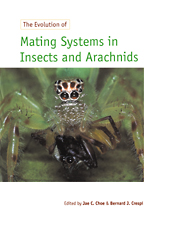Book contents
- Frontmatter
- Contents
- Contributors
- Acknowledgements
- Introduction
- 1 Evolutionary perspectives on insect mating
- 2 Sexual selection by cryptic female choice in insects and arachnids
- 3 Natural and sexual selection components of odonate mating patterns
- 4 Sexual selection in resource defense polygyny: lessons from territorial grasshoppers
- 5 Reproductive strategies of the crickets (Orthoptera: Gryllidae)
- 6 The evolution of edible ‘sperm sacs’ and other forms of courtship feeding in crickets, katydids and their kin (Orthoptera: Ensifera)
- 7 The evolution of mating systems in the Zoraptera: mating variations and sexual conflicts
- 8 The evolution of water strider mating systems: causes and consequences of sexual conflicts
- 9 Multiple mating, sperm competition, and cryptic female choice in the leaf beetles (Coleoptera: Chrysomelidae)
- 10 Firefly mating ecology, selection and evolution
- 11 Modern mating systems in archaic Holometabola: sexuality in neuropterid insects
- 12 Mating systems of parasitoid wasps
- 13 Fig–associated wasps: pollinators and parasites, sex–ratio adjustment and male polymorphism, population structure and its consequences
- 14 Evolution of mate–signaling in moths: phylogenetic considerations and predictions from the asymmetric tracking hypothesis
- 15 Sexual dimorphism, mating systems and ecology in butterflies
- 16 Lek behavior of insects
- 17 Mate choice and species isolation in swarming insects
- 18 Function and evolution of antlers and eye stalks in flies
- 19 Sex via the substrate: mating systems and sexual selection in pseudoscorpions
- 20 Jumping spider mating strategies: sex among cannibals in and out of webs
- 21 Sexual conflict and the evolution of mating systems
- Organism index
- Subject index
12 - Mating systems of parasitoid wasps
Published online by Cambridge University Press: 03 May 2010
- Frontmatter
- Contents
- Contributors
- Acknowledgements
- Introduction
- 1 Evolutionary perspectives on insect mating
- 2 Sexual selection by cryptic female choice in insects and arachnids
- 3 Natural and sexual selection components of odonate mating patterns
- 4 Sexual selection in resource defense polygyny: lessons from territorial grasshoppers
- 5 Reproductive strategies of the crickets (Orthoptera: Gryllidae)
- 6 The evolution of edible ‘sperm sacs’ and other forms of courtship feeding in crickets, katydids and their kin (Orthoptera: Ensifera)
- 7 The evolution of mating systems in the Zoraptera: mating variations and sexual conflicts
- 8 The evolution of water strider mating systems: causes and consequences of sexual conflicts
- 9 Multiple mating, sperm competition, and cryptic female choice in the leaf beetles (Coleoptera: Chrysomelidae)
- 10 Firefly mating ecology, selection and evolution
- 11 Modern mating systems in archaic Holometabola: sexuality in neuropterid insects
- 12 Mating systems of parasitoid wasps
- 13 Fig–associated wasps: pollinators and parasites, sex–ratio adjustment and male polymorphism, population structure and its consequences
- 14 Evolution of mate–signaling in moths: phylogenetic considerations and predictions from the asymmetric tracking hypothesis
- 15 Sexual dimorphism, mating systems and ecology in butterflies
- 16 Lek behavior of insects
- 17 Mate choice and species isolation in swarming insects
- 18 Function and evolution of antlers and eye stalks in flies
- 19 Sex via the substrate: mating systems and sexual selection in pseudoscorpions
- 20 Jumping spider mating strategies: sex among cannibals in and out of webs
- 21 Sexual conflict and the evolution of mating systems
- Organism index
- Subject index
Summary
ABSTRACT
Parasitoid wasps are a large group of hymenopteran insects whose larvae develop by feeding on the bodies of other insects. The spatial distributions of both the hosts and the parasitoid larvae influence the mating systems found in these wasps. Specifically, there is a strong tendency towards mating at the emergence site in species whose offspring develop in gregarious clutches and in species that attack clumped hosts. The genetic and sex–determination systems of parasitoids also influence their mating systems. All sexual parasitic wasps are haplodiploid, with unfertilized eggs becoming males. Thus females can produce male offspring without mating. Some species also show complementary sex determination (CSD) with sex determined by the segregation of alleles at a highly polymorphic sex determination locus. A consequence of this is that inbreeding leads to the production of sterile diploid males. There is therefore selection for females to avoid inbreeding in species with CSD and this is achieved via a premating refractory period in Bracon hebetor. However, we also expect sexual conflict with respect to inbreeding as males are probably selected to take all available mating opportunities.
While laboratory studies of parasitoids have yielded considerable insights, there is a need for more field data on mating systems. Laboratory studies are also needed to help delimit the distribution of CSD, and to investigate patterns of sperm use and mate choice.
Information
- Type
- Chapter
- Information
- The Evolution of Mating Systems in Insects and Arachnids , pp. 211 - 225Publisher: Cambridge University PressPrint publication year: 1997
Accessibility standard: Unknown
Why this information is here
This section outlines the accessibility features of this content - including support for screen readers, full keyboard navigation and high-contrast display options. This may not be relevant for you.Accessibility Information
- 54
- Cited by
